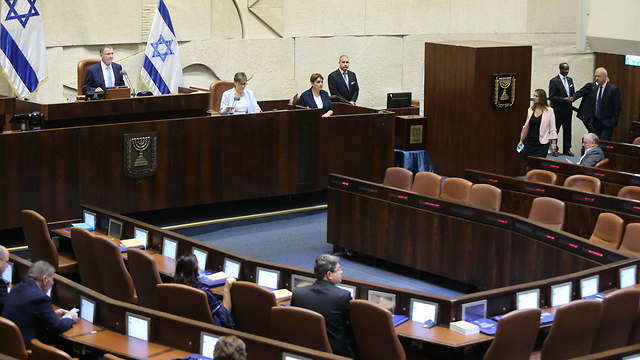

What Israel can learn from the American political system
Opinion: Imagine that each area of the country, with its infinite sectoral divides, had a representative whose job is was to care exclusively about the welfare of their constituency, without fear of reprisal from political leaders, who was answerable solely to their electorate
Israel is not America, and while that's generally a good thing, there is something we can learn about systems of government from our big sister abroad.
Imagine that Israel had the same geographical representation as every state in the United States, which has a representative in Congress elected by its residents and whose job it is to take care of its specific interests at the highest levels.

Voting to facilitate this could be held on two ballots: one for a party, and one for a local candidate by name. This would ensure that there is a representative for each part of the country, from the Golan Heights to the Arava, who is directly chosen by the residents themselves.
In a fragmented and divided society as ours, there is no point in trying to blur the differences between us, as this just leads to separation and discrimination.
It would better to bring these divisions to a House of Representatives, a place where the various problems troubling each sector of society could be discussed in a fitting arena.
For example, when a report on air pollution in the Haifa district is released, the residents of those areas need not be satisfied with a demonstration or a TV interview - they could also demand that their representative act on their behalf in parliament.
And if that representative were a member of the ruling coalition, a threat to shut down the government would guarantee that any concerns raised would not be ignored.
The representative would not fear coalition discipline or the prime minister's political might, for their own power would stem solely from the residents of the region they represent.
The representative would have to exert pressure on the issue, or otherwise face the prospect of being voted out of office by their electorate.
This would mean that social crises that should be transparent do not disappear under the radar - from the pepper growers of the Negev Desert and the closure of Tel Aviv's Sde Dov airport to the state of health services in the north and the incendiary balloons that have been an almost constant threat to communities on the Gaza border.
The State of Israel may be a very small country, but different geographical locations reflect societal rifts. Take for example the areas in the periphery, where there is a disturbing preponderance of Mizrahi, immigrant and ultra-Orthodox communities.
Geographical representation would almost completely reflect both the diverse identities of the country as well as the problems we tend to treat as secondary because of their specificity.
Direct voting for a district representative would greatly change the face of Israeli politics. For when we look at the various Knesset lists, we can see two trends.
Firstly, almost every party lists was put together without a primary, chosen according to what the political leaders view as a successful mix of candidates.
This is why the Blue and White party is a party of generals, the Meretz-Barak-Shaffir camp all white, Shas is entirely Sephardic ultra-Orthodox men and so on.
The representatives for these parties were not chosen by the public, and in fact their method of selection was more like casting for a reality show – people who seem attractive enough, young enough, religious enough, and so on. In other words, show what is called "promise."
But this is the way that talented and experienced MKs such as Aliza Lavie or Haim Jelin are pushed down into unrealistic spots on the party list, having been cast aside for the benefit of candidates whose star will be shine for one term and then vanish.
Secondly, the large parties have an absolute majority of residents from the Tel Aviv and Jerusalem areas. In the Meretz-Barak-Shaffir camp, for example, three of the first four spots on the list are held by Tel Aviv residents, and the fourth has been given to someone who lives in Rosh Ha'ayin, just a few miles away.
Allowing party leaders to increase gender, ethnic and geographic diversity may backfire, but a vote for a local representative could solve at least some of the problems.
Instead of an engineered formula, the public would be able to decide for themselves who best serves their interests when it comes to the issues of daily life - education, health and welfare - and not just when it comes to Iran or the authority of the courts.
















